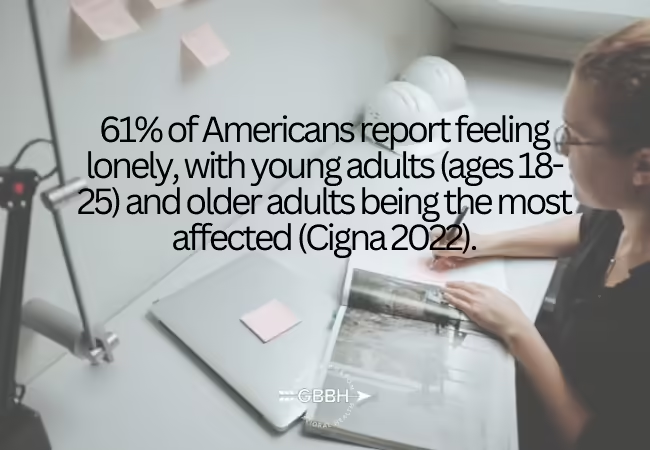Our mental health is deeply intertwined with the connections we maintain and the environments we live in. Positive relationships and supportive environments can foster resilience, enhance emotional well-being, and provide a foundation for personal growth. Conversely, toxic relationships and chaotic surroundings can exacerbate stress, anxiety, and other mental health challenges. Recognizing and addressing these influences is essential for a holistic approach to mental health care.
From our relationships to our physical surroundings, these factors play a crucial role in shaping how we think, feel, and behave. A supportive environment and meaningful connections can significantly improve mental well-being, while toxic influences can take a toll. If you’re exploring behavioral health in Boston, understanding this connection-environment dynamic is vital.
The Role of Connection in Mental Health
Humans are inherently social beings, and our relationships greatly impact our emotional well-being. Studies show that supportive relationships with friends, family, or even coworkers can help reduce stress, increase resilience, and promote happiness.
In therapeutic settings like DBT Therapy (Dialectical Behavior Therapy), building strong interpersonal skills is a cornerstone. This form of therapy teaches individuals how to navigate relationships effectively, manage conflict, and create meaningful connections. Similarly, CBT Therapy (Cognitive Behavioral Therapy) focuses on changing negative thought patterns that may harm relationships, helping clients foster healthier interactions.
Whether through family, friends, or community, positive social connections can act as protective factors against stress and mental illness. On the other hand, a lack of supportive relationships or toxic interactions can have the opposite effect.
1. The Benefits of Strong Social Connections
- Emotional Support: Close relationships provide a buffer against stress, offering comfort and encouragement during challenging times.
- Increased Resilience: A strong support network helps individuals navigate life’s obstacles with greater confidence and stability.
- Sense of Belonging: Meaningful connections foster a sense of identity and community, reducing feelings of loneliness and isolation.
2. The Risks of Social Isolation
Social isolation can have profound effects on mental health, including:
- Higher Rates of Depression and Anxiety: Prolonged loneliness increases the risk of developing mental health conditions.
- Cognitive Decline: Isolation has been linked to decreased cognitive functioning and memory loss over time.
- Increased Stress and Physical Health Risks: Chronic loneliness can lead to elevated stress levels, which are associated with cardiovascular disease and weakened immunity.
3. Strategies for Building Healthy Connections
- Participate in Therapy: Group therapy or family therapy fosters open communication and strengthens relationships.
- Join Community Activities: Engaging in local events or volunteer programs helps build meaningful connections.
- Focus on Quality, Not Quantity: A few close, trusted relationships are more impactful than numerous superficial ones.
Connection, Environment, and Mental Health Disorders
Connection and environment play significant roles in the development and management of mental health disorders. Here’s how they impact specific conditions:
1. Anxiety Disorders
- Connections: Supportive relationships help reduce feelings of fear and uncertainty, while toxic relationships may exacerbate anxiety.
- Environment: Calm and organized spaces reduce sensory overload and promote relaxation, while chaotic environments may intensify anxiety symptoms.
2. Depression
- Connections: Isolation and lack of meaningful relationships can deepen feelings of sadness and hopelessness, while strong social bonds provide motivation and joy.
- Environment: Dim, cluttered, or unsafe spaces can worsen depressive symptoms. Bright, clean, and comfortable environments foster hope and energy.
3. Trauma-Related Disorders
- Connections: Safe and trusting relationships are critical for trauma recovery, while toxic connections can retrigger traumatic memories.
- Environment: A secure, non-threatening environment is essential for rebuilding a sense of safety and stability.
Therapeutic Approaches to Address Connection and Environment
Professional therapy helps individuals explore the influence of their connections and environments, offering tools to create healthier relationships and spaces.
1. Cognitive Behavioral Therapy (CBT)
- Focuses on identifying and changing negative thought patterns shaped by toxic relationships or environments.
- Teaches strategies for creating positive, supportive connections and addressing environmental triggers.
2. Dialectical Behavior Therapy (DBT)
- Emphasizes skills for emotional regulation, distress tolerance, and interpersonal effectiveness, particularly useful for managing difficult relationships.
- Helps individuals set boundaries, communicate effectively, and navigate challenging environments.
3. Holistic Mental Health Treatment Programs
- Programs at a Mental Health Treatment Center in Boston provide a comprehensive approach, integrating therapy, mindfulness, and other practices to address relational and environmental factors.
- Family therapy and group therapy are key components, fostering connection and support within relationships.
How Environment Shapes Mental Health
Your environment also profoundly impacts your mental health. Factors such as access to green spaces, living conditions, community safety, and work environments can either support or hinder your mental well-being. For example, urban environments can sometimes contribute to stress due to noise, overcrowding, and lack of access to nature.
Those in Boston are fortunate to have resources that address these environmental challenges. By exploring mental health treatment programs tailored to individual needs, you can find ways to adapt to and improve your surroundings. Mental health therapy programs often incorporate holistic approaches, emphasizing the importance of balancing personal, social, and environmental factors.
How to Improve Connections and Environments for Mental Health
1. Strengthen Your Social Network
- Reach out to trusted friends or family members to deepen connections.
- Join support groups or community activities to meet like-minded individuals.
- Seek professional support if building relationships feels overwhelming.
2. Create a Supportive Environment
- Declutter and organize your living space to reduce stress.
- Incorporate elements of nature, such as plants or outdoor time, to promote calm.
- Set boundaries to ensure your environment feels emotionally safe and secure.
3. Address Toxic Influences
- Limit time spent in negative or harmful environments.
- Establish boundaries in relationships that feel draining or unsupportive.
- Seek professional guidance to navigate and improve difficult situations.
Behavioral Health Resources in Boston
If you’re in the Boston area and seeking support, you’re not alone. Boston boasts a range of high-quality resources for mental health care, including specialized treatments like DBT Therapy and CBT Therapy. These evidence-based therapies are offered at leading centers like Greater Boston Behavioral Health, located in Needham, MA, just 30 minutes west of downtown Boston.
Greater Boston Behavioral Health is a progressive new mental health treatment center in Boston, offering a range of mental health treatment programs for individuals struggling with psychological challenges. Their team of experienced professionals is committed to providing compassionate, evidence-based care.
Why Choose Greater Boston Behavioral Health?
At Greater Boston Behavioral Health, the focus is on treating the whole person. Their mental health therapy programs include a blend of traditional and innovative therapies designed to empower individuals on their journey to recovery. Whether you’re navigating depression, anxiety, or other challenges, this center provides hope and support tailored to your unique needs.
Here’s why Greater Boston Behavioral Health stands out:
- Personalized Care: The center tailors its programs to meet each individual’s specific needs, recognizing that no two journeys are the same.
- Proximity and Accessibility: Located in Needham, it offers a tranquil environment close to Boston while being easily accessible to the city.
- Comprehensive Programs: From CBT Therapy to DBT Therapy, their evidence-based approaches ensure clients receive the best care possible.
- Supportive Environment: The center’s serene setting fosters healing, enabling clients to focus on their mental health journey without distractions.
Taking the First Step
Taking the step toward improving your mental health can feel overwhelming, but the rewards are worth it. Whether you’re dealing with long-standing challenges or recent stressors, exploring Boston behavioral health resources can be transformative.
No matter how hopeless you feel, their compassionate team is here to guide you toward better days. Their mental health treatment programs are designed to provide the tools and support needed to overcome obstacles and embrace a healthier, more fulfilling life.
Conclusion
The interplay between connection and environment is undeniable when it comes to mental health. By nurturing supportive relationships and cultivating a positive environment, you can make meaningful strides toward mental well-being. For those in Boston, resources like Greater Boston Behavioral Health provide a beacon of hope.
At their mental health treatment center in Boston, individuals receive the care, guidance, and encouragement they need to thrive. With a combination of evidence-based therapies like DBT Therapy and CBT Therapy, as well as a supportive, healing environment, this center helps clients transform their lives.
If you’re ready to explore how connection and environment shape your mental health and take steps toward positive change, Greater Boston Behavioral Health is here to help. Contact us today at (888)278-0716 to learn more about our programs and begin your journey to emotional wellness.
FAQs on Connection and Environment Shape Mental Health
How do relationships affect mental health?
Positive relationships provide emotional support, reduce stress, and foster resilience, while toxic or distant connections can contribute to anxiety, depression, and loneliness.
What role does the environment play in mental health?
A supportive, organized, and safe environment promotes relaxation and emotional stability, while chaotic or toxic spaces can increase stress and exacerbate mental health issues.
What are some signs of a toxic environment?
- Constant conflict or negativity.
- Lack of emotional safety or support.
- Physical disorganization or poor lighting that creates stress.
How can I improve my social connections?
- Participate in group therapy or community activities.
- Strengthen communication with family and friends.
- Seek professional support to navigate challenging relationships.
How can therapy help with connection and environment issues?
Therapies like CBT Therapy and DBT Therapy help individuals identify and address negative thought patterns, improve emotional regulation, and build healthier relationships and environments.
What are examples of environmental changes that can improve mental health?
- Decluttering and organizing living spaces.
- Incorporating natural light and green plants.
- Setting boundaries to create a safe and peaceful atmosphere.
What programs are available at Greater Boston Behavioral Health to address these issues?
We offer:
- CBT Therapy and DBT Therapy for relationship and environmental stressors.
- Family Therapy Programs to strengthen bonds and improve communication.
- Mental Health Treatment Programs with holistic approaches for long-term well-being.


